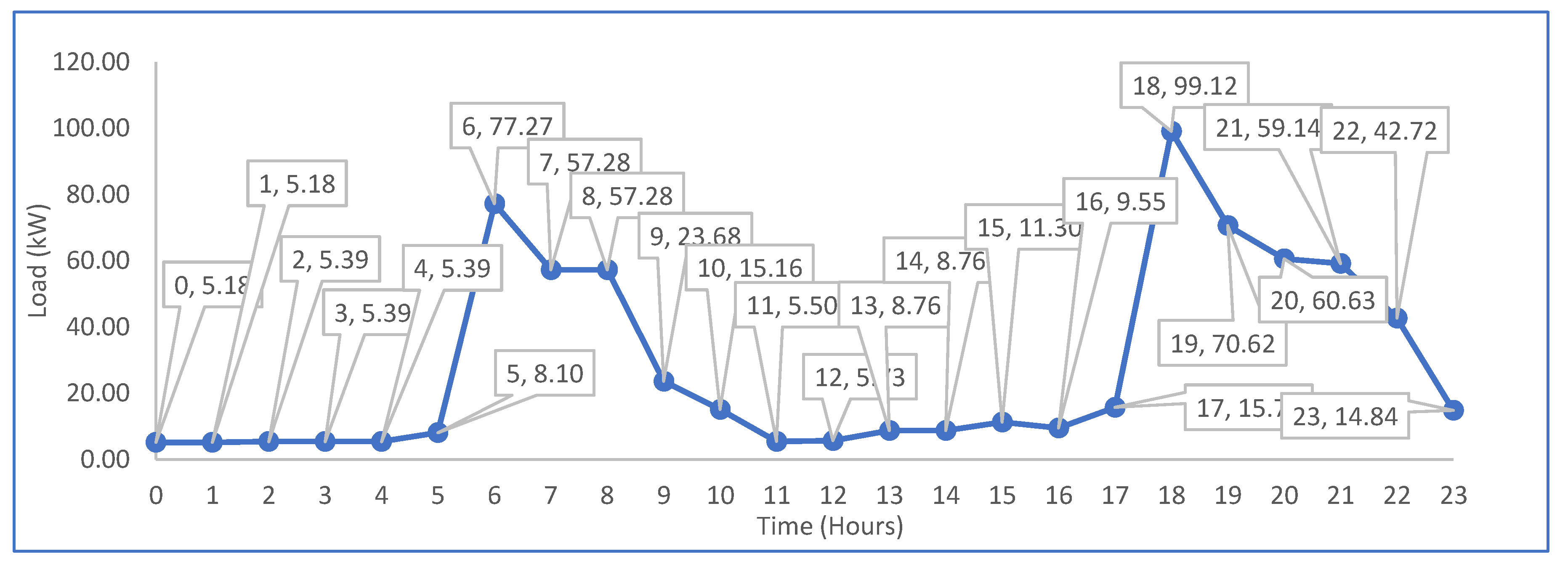Submitted:
18 September 2024
Posted:
20 September 2024
You are already at the latest version
Abstract
Keywords:
1. Introduction
2. Materials and Methods
2.1. Description of Okorobo-Ile Town and Load Profile
2.2. Resource Data
2.3. Mathematical model of the HRES
2.3.1. PV panels
2.3.2. Wind Turbine
2.3.3. Number of Inverters
2.3.4. Number of Batteries
2.4. Optimization Problem Formulation
2.4.1. Decision Variables
2.4.2. Objective Function
2.4.3. Constraint
2.4.4. Technique for Optimization
2.5. Energy Balance, Control and Load Management
- Calculate total DC power: This is calculated by adding the power output from the WT and PV panels.
- Calculate the energy balance (E_b): This is calculated by subtracting the load profile (the energy demand at time i) from the total DC power.
- Update battery state of charge (SOC): Depending on the energy balance, the battery SOC is updated as follows:
- 4.
- Calculate remaining load: The remaining load is calculated by subtracting the total DC power and the change in battery SOC from the load profile.
- 5.
- Possible diesel generator operation: If there is a remaining load, the diesel generator is used. The amount of generation is limited by the generator’s capacity and its minimum load. The generator’s ramp rate is also taken into account to limit the change in generation from one time step to the next.
2.6. Technical Specifications for Optimization
3. Results and Discussion
3.1. Result from Particle Swarm Optimization
3.2. Result from Hybrid GA – PSO
3.3. Result from NGSA- II
3.4. Result from HOMER
3.4. Performance Evaluation of Solution under Various Ambient Conditions
- Case 1: The battery’s state of charge varies between 124 kWh and 367.4 kWh, demonstrating that the system can handle the load demand under typical weather conditions.
- Case 2: The battery’s state of charge remains mostly stable at 124 kWh, indicating a high discharge rate due to insufficient PV and wind generation. This suggests that the HRES struggles to meet the load demand during poor weather, heavily relying on the battery.
- Case 3: The battery’s state of charge ranges from 257.3 kWh to 620 kWh. It discharges when the PV and wind generation fall short of the load demand but stays fully charged when there is surplus generation from the HRES. This shows that the system effectively manages the load demand under favorable weather conditions, with the battery providing necessary backup.
4. Conclusions
Author Contributions
Data Availability Statement
Conflicts of Interest
References
- Nigeria Electricity Production. Accessed March 14, 2024. https://www.ceicdata.com/en/indicator/nigeria/electricity-production.
- Agajie, T.F.; Fopah-Lele, A.; Amoussou, I.; Ali, A.; Khan, B.; Tanyi, E. Optimal Design and Mathematical Modeling of Hybrid Solar PV–Biogas Generator with Energy Storage Power Generation System in Multi-Objective Function Cases. Sustainability 2023, 15, 8264. [Google Scholar] [CrossRef]
- Adewuyi, O.B.; Shigenobu, R.; Senjyu, T.; Lotfy, M.; Howlader, A.M. Multiobjective mix generation planning considering utility-scale solar PV system and voltage stability: Nigerian case study. Electr. Power Syst. Res. 2019, 168, 269–282. [Google Scholar] [CrossRef]
- Al-Masri, H.M.; Al-Sharqi, A.A. Technical design and optimal energy management of a hybrid photovoltaic biogas energy system using multi-objective grey wolf optimisation. IET Renew. Power Gener. 2020, 14, 2765–2778. [Google Scholar] [CrossRef]
- Xu, L.; Ruan, X.; Mao, C.; Zhang, B.; Luo, Y. An improved optimal sizing method for wind-solar-battery hybrid power system. IEEE Trans. Sustain. Energy 2013, 4, 774–785. [Google Scholar]
- Al-Masri, H.M.K.; Magableh, S.; Abuelrub, A.; Saadeh, O.; Ehsani, M. Impact of Different Photovoltaic Models on the Design of a Combined Solar Array and Pumped Hydro Storage System. Appl. Sci. 2020, 10, 3650. [Google Scholar] [CrossRef]
- Nguyen, H.T.; Safder, U.; Nguyen, X.; Yoo, C. Multi-objective decision-making and optimal sizing of a hybrid renewable energy system to meet the dynamic energy demands of a wastewater treatment plant. Energy 2020, 191, 116570. [Google Scholar] [CrossRef]
- Tian, Z.; Seifi, A.A. Reliability Analysis of Hybrid Energy System. Int. J. Reliab. Qual. Saf. Eng. 2014, 21, 1450011. [Google Scholar] [CrossRef]
- Upadhyay, S.; Sharma, M.P. Development of hybrid energy system with cycle charging strategy using particle swarm optimization for a remote area in India. Renew. Energy 2015, 77, 586–598. [Google Scholar] [CrossRef]
- Ma, T.; Yang, H.; Lu, L.; Peng, J. Pumped storage-based standalone photovoltaic power generation system: Modeling and techno-economic optimization. Appl. Energy 2015, 137, 649–659. [Google Scholar] [CrossRef]
- Al-Masri, H.M.; Al-Sharqi, A.; Magableh, S.; Al-Shetwi, A.; Abdolrasol, M.; Ustun, T.S. Optimal Allocation of a Hybrid Photovoltaic Biogas Energy System Using Multi-Objective Feasibility Enhanced Particle Swarm Algorithm. Sustainability 2022, 14, 685. [Google Scholar] [CrossRef]
- Sultan, H.M.; Menesy, A.; Kamel, S.; Korashy, A.; Almohaimeed, S.; Abdel-Akher, M. An improved artificial ecosystem optimization algorithm for optimal configuration of a hybrid PV/WT/FC energy system. Alex. Eng. J. 2021, 60, 1001–1025. [Google Scholar] [CrossRef]
- Ukoima, K. N., Okoro, O. I. Obi, P. I., Akuru, U. B., Davidson, E. A modified multiobjective particle swarm optimization (m-mopso) for optimal sizing of a solar – wind – battery hybrid renewable energy system. Solar compass (2024). [CrossRef]
- Diab, A.A.Z.; Sultan, H.; Kuznetsov, O.N. Optimal sizing of hybrid solar/wind/hydroelectric pumped storage energy system in Egypt based on different meta-heuristic techniques. Environ. Sci. Pollut. Res. 2020, 27, 32318–32340. [Google Scholar] [CrossRef] [PubMed]
- Alotaibi, M.A.; Eltamaly, A.M. A Smart Strategy for Sizing of Hybrid Renewable Energy System to Supply Remote Loads in Saudi Arabia. Energies 2021, 14, 7069. [Google Scholar] [CrossRef]
- lturki, F.A.; Awwad, E.M. Sizing and cost minimization of standalone hybrid wt/pv/biomass/pump-hydro storage-based energy systems. Energies 2021, 14, 489. [Google Scholar] [CrossRef]
- Çetinbaş, İ.; Tamyürek, B.; Demirtaş, M. Sizing optimization and design of an autonomous AC microgrid for commercial loads using Harris Hawks Optimization algorithm. Energy Convers. Manag. 2021, 245, 114562. [Google Scholar] [CrossRef]
- Bukar, A.L.; Tan, C.; Lau, K.Y. Optimal sizing of an autonomous photovoltaic/wind/battery/diesel generator microgrid using grasshopper optimization algorithm. Sol. Energy 2019, 188, 685–696. [Google Scholar] [CrossRef]
- Diab, A.A.Z.; Sultan, H.; Mohamed, I.; Kuznetsov, O.; Do, T.D. Application of Different Optimization Algorithms for Optimal Sizing of PV/Wind/Diesel/Battery Storage Stand-Alone Hybrid Microgrid. IEEE Access 2019, 7, 119223–119245. [Google Scholar] [CrossRef]
- Arasteh, A.; Alemi, P.; Beiraghi, M. Optimal allocation of photovoltaic/wind energy system in distribution network using metaheuristic algorithm. Appl. Soft Comput. 2021, 109, 107594. [Google Scholar] [CrossRef]
- Suresh, M.; Meenakumari, R.; Panchal, H.; Priya, V.; El Agouz, E.; Israr, M. An enhanced multiobjective particle swarm optimisation algorithm for optimum utilisation of hybrid renewable energy systems. Int. J. Ambient Energy 2022, 43, 2540–2548. [Google Scholar] [CrossRef]
- Fadli, D.; Purwoharjono, H. Optimal sizing of PV/Diesel/battery hybrid micro-grid system using multi-objective bat algorithm. Int. J. Eng. Sci. 2019, 8, 6–14. [Google Scholar]
- Shi, B.; Wu, W.; Yan, L. Size optimization of stand-alone PV/wind/diesel hybrid power generation systems. J. Taiwan Inst. Chem. Eng. 2017, 73, 93–101. [Google Scholar] [CrossRef]
- Javed, M.S.; Ma, T. Techno-economic assessment of a hybrid solar-wind-battery system with genetic algorithm. Energy Procedia 2019, 158, 6384–6392. [Google Scholar] [CrossRef]
- Emad, D.; El-Hameed, M.; El-Fergany, A.A. Optimal techno-economic design of hybrid PV/wind system comprising battery energy storage: Case study for a remote area. Energy Convers. Manag. 2021, 249, 114847. [Google Scholar] [CrossRef]
- Hatata, A.Y.; Osman, G.; Aladl, M.M. An optimization method for sizing a solar/wind/battery hybrid power system based on the artificial immune system. Sustain. Energy Technol. Assess. 2018, 27, 83–93. [Google Scholar] [CrossRef]
- Askarzadeh, A.; Coelho, L.S. A novel framework for optimization of a grid independent hybrid renewable energy system: A case study of Iran. Sol. Energy 2015, 112, 383–396. [Google Scholar] [CrossRef]
- Li, J.; Liu, P.; Li, Z. Optimal design and techno-economic analysis of a solar-wind-biomass off-grid hybrid power system for remote rural electrification: A case study of west China. Energy 2020, 208, 118387. [Google Scholar] [CrossRef]
- Goswami, A.; Sadhu, P.; Sadhu, P.K. Development of a grid connected solar-wind hybrid system with reduction in levelized tariff for a remote island in India. J. Sol. Energy Eng. 2020, 142, 044501. [Google Scholar] [CrossRef]
- Aziz, A.S.; Tajuddin, M.; Adzman, M.; Azmi, A.; Ramli, M.A. Optimization and sensitivity analysis of standalone hybrid energy systems for rural electrification: A case study of Iraq. Renew. Energy 2019, 138, 775–792. [Google Scholar] [CrossRef]
- Kumar, R.; Channi, H.K. A PV-Biomass off-grid hybrid renewable energy system (HRES) for rural electrification: Design, optimization and techno-economic-environmental analysis. J. Clean. Prod. 2022, 349, 131347. [Google Scholar] [CrossRef]
- Hashem, M.; Abdel-Salam, M.; El-Mohandes, M.T.; Nayel, M.; Ebeed, M. Optimal placement and sizing of wind turbine generators and superconducting magnetic energy storages in a distribution system. J. Energy Storage 2021, 38, 102497. [Google Scholar] [CrossRef]
- Duchaud, J.-L.; Notton, G.; Darras, C.; Voyant, C. Multi-Objective Particle Swarm optimal sizing of a renewable hybrid power plant with storage. Renew Energy 2018, 131, 1156–1167. [Google Scholar] [CrossRef]
- Rezk, H.; Alghassab, M.; Ziedan, H.A. An Optimal Sizing of Stand-Alone Hybrid PV-Fuel Cell-Battery to Desalinate Seawater at Saudi NEOM City. Processes 2020, 8, 382. [Google Scholar] [CrossRef]
- Donado, K.; Navarro, L.; Pardo, M. HYRES: A Multi-Objective Optimization Tool for Proper Configuration of Renewable Hybrid Energy Systems. Energies 2019, 13, 26. [Google Scholar] [CrossRef]
- Ukoima, K. N., Owolabi, A. B., Yakub, A. O., Same, N. N., Suh, D., Huh, J. Analysis of a Solar Hybrid Electricity Generation System for a Rural Community in River State, Nigeria Energies 6 (3431) 1 – 16. [CrossRef]
- Dong, W.; Li, Y.; Xiang, J. Optimal sizing of a stand-alone hybrid power system based on battery/hydrogen with an improved ant colony optimization. Energies 2016, 9, 785. [Google Scholar] [CrossRef]
- Ukoima, K. N., Efughu, D., Azubuike, O. C., Akpiri, B. F. Investigating the Optimal Photovoltaic (Pv) Tilt Angle Using the Photovoltaic Geographic Information System (PVGIS). Nigerian Journal of Technology (NIJOTECH), 43(1) (2024) 101-11. [CrossRef]
- Ukoima, K. N., Okoro, O. I., Akuru, U. B., Davidson, E. Technical, economic and environmental assessment and optimization of four hybrid renewable energy models for rural electrification. Solar compass (2024). [CrossRef]
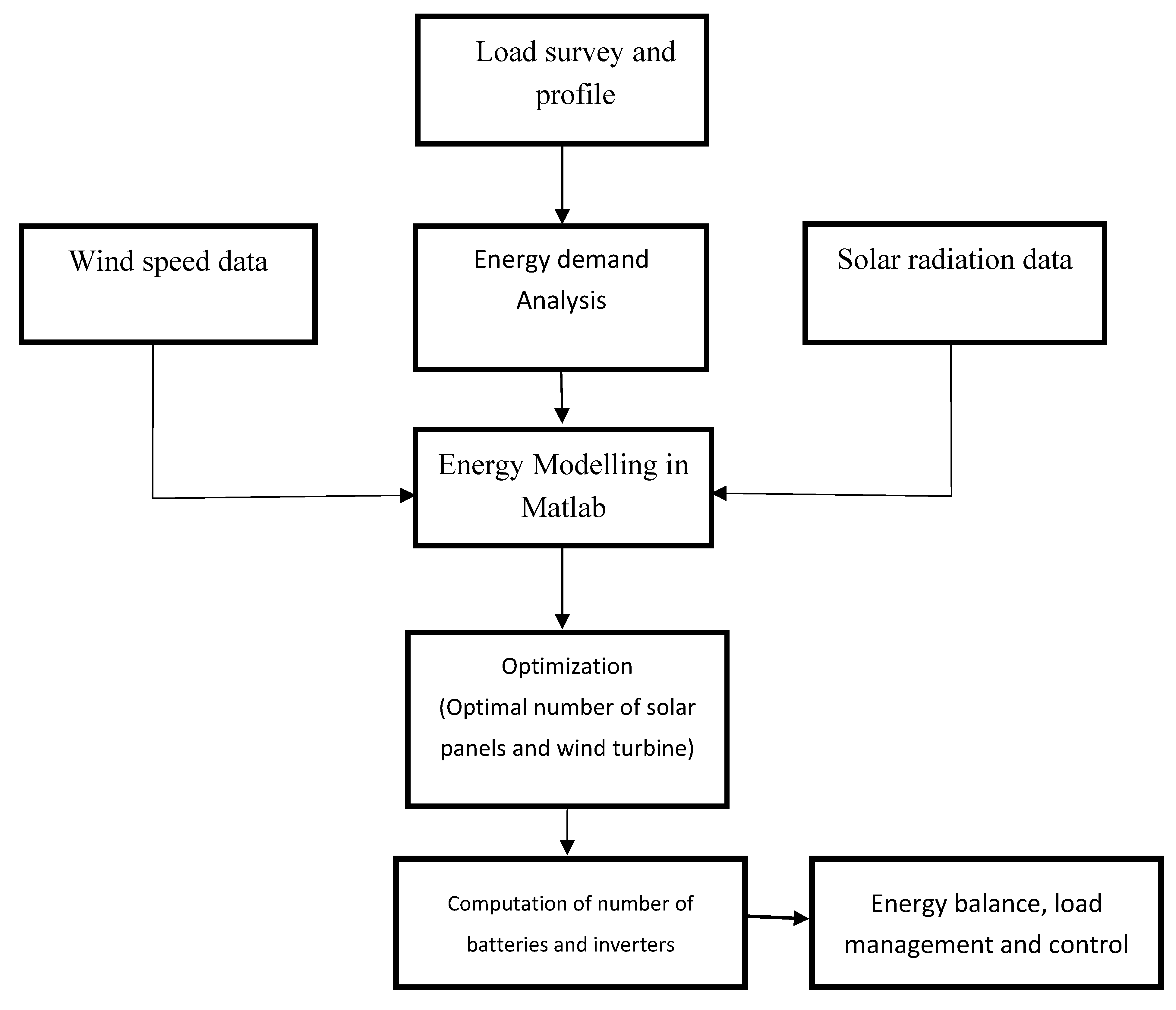
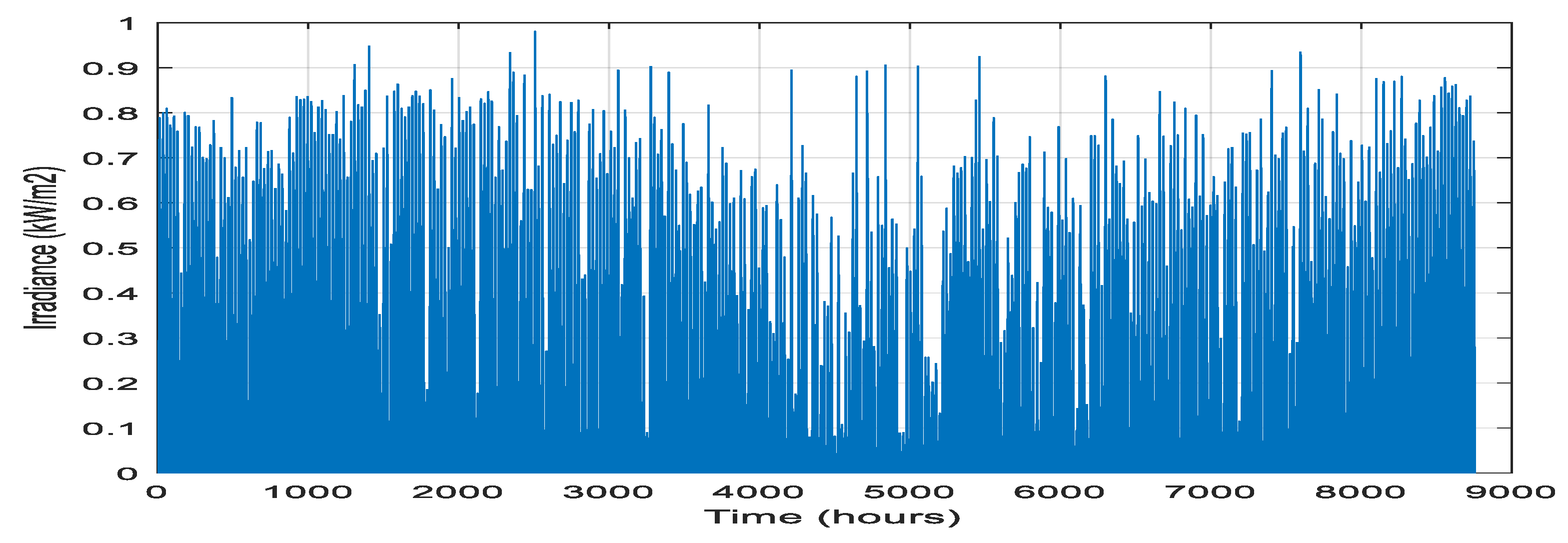
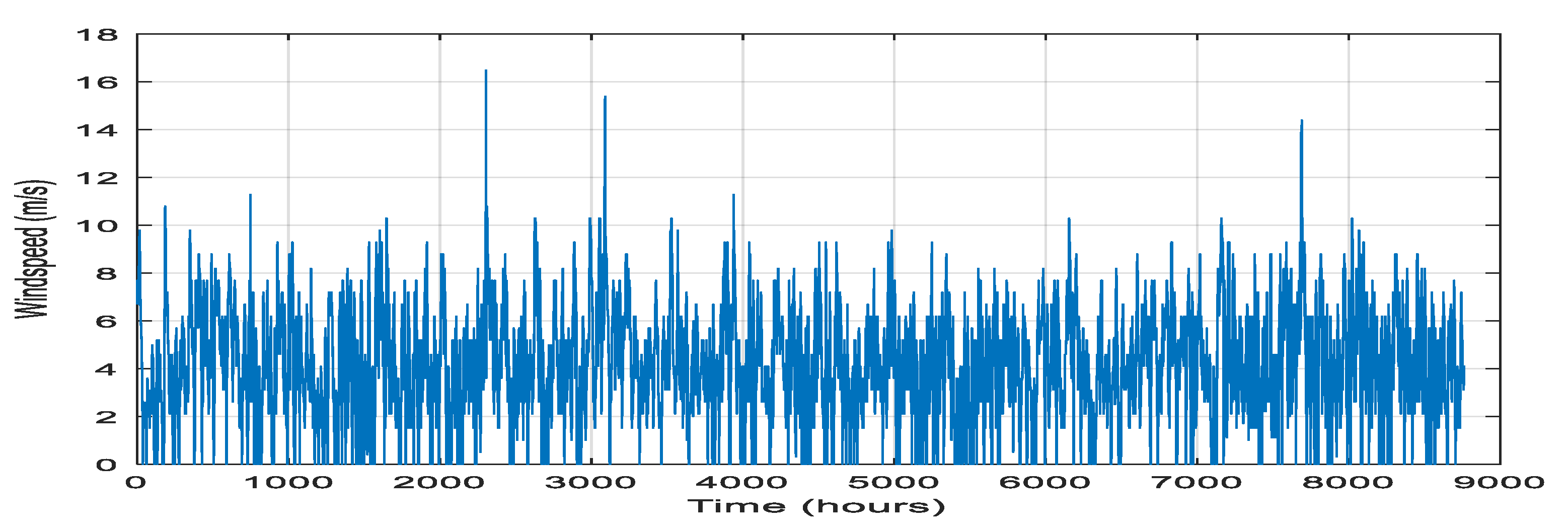
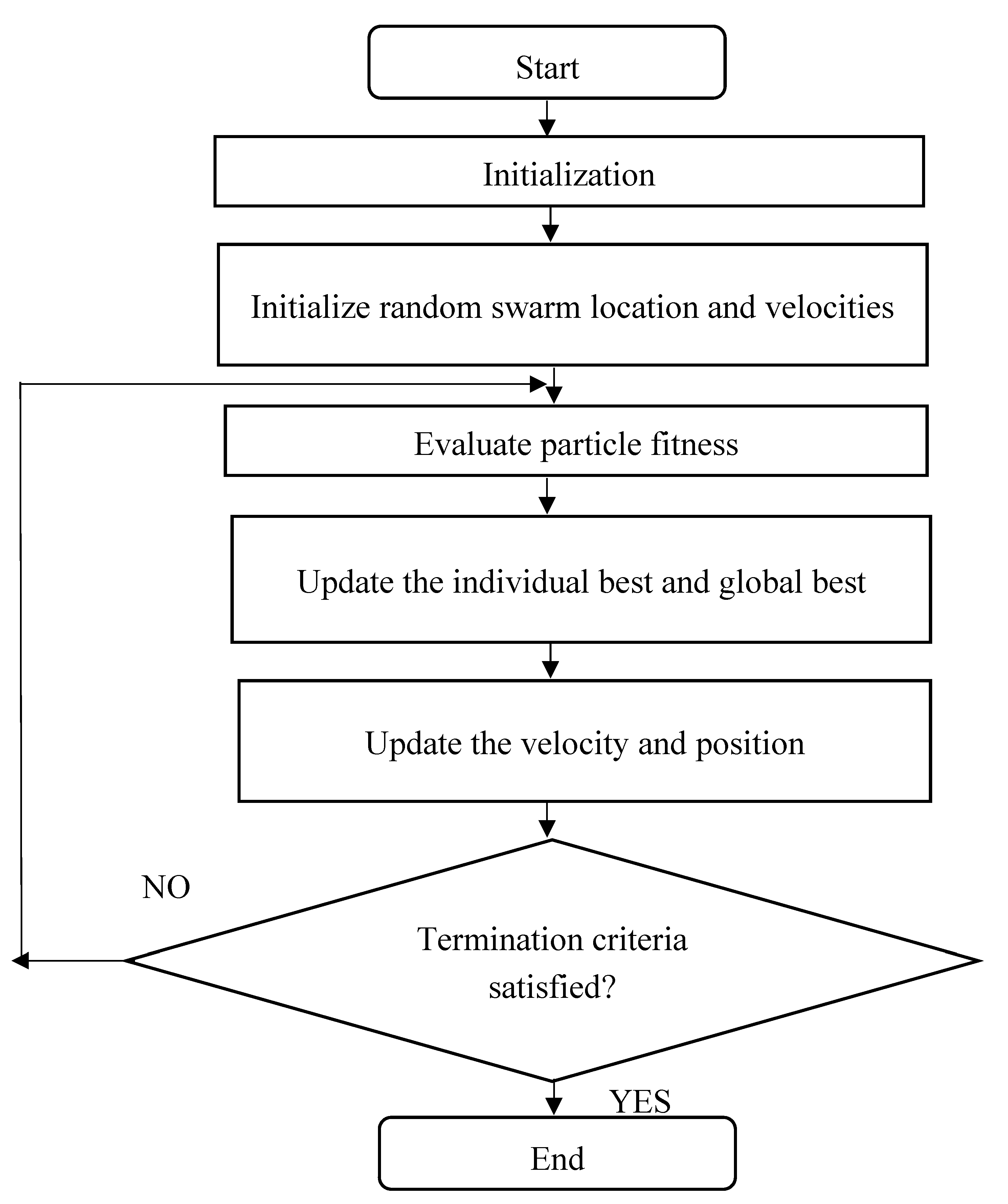


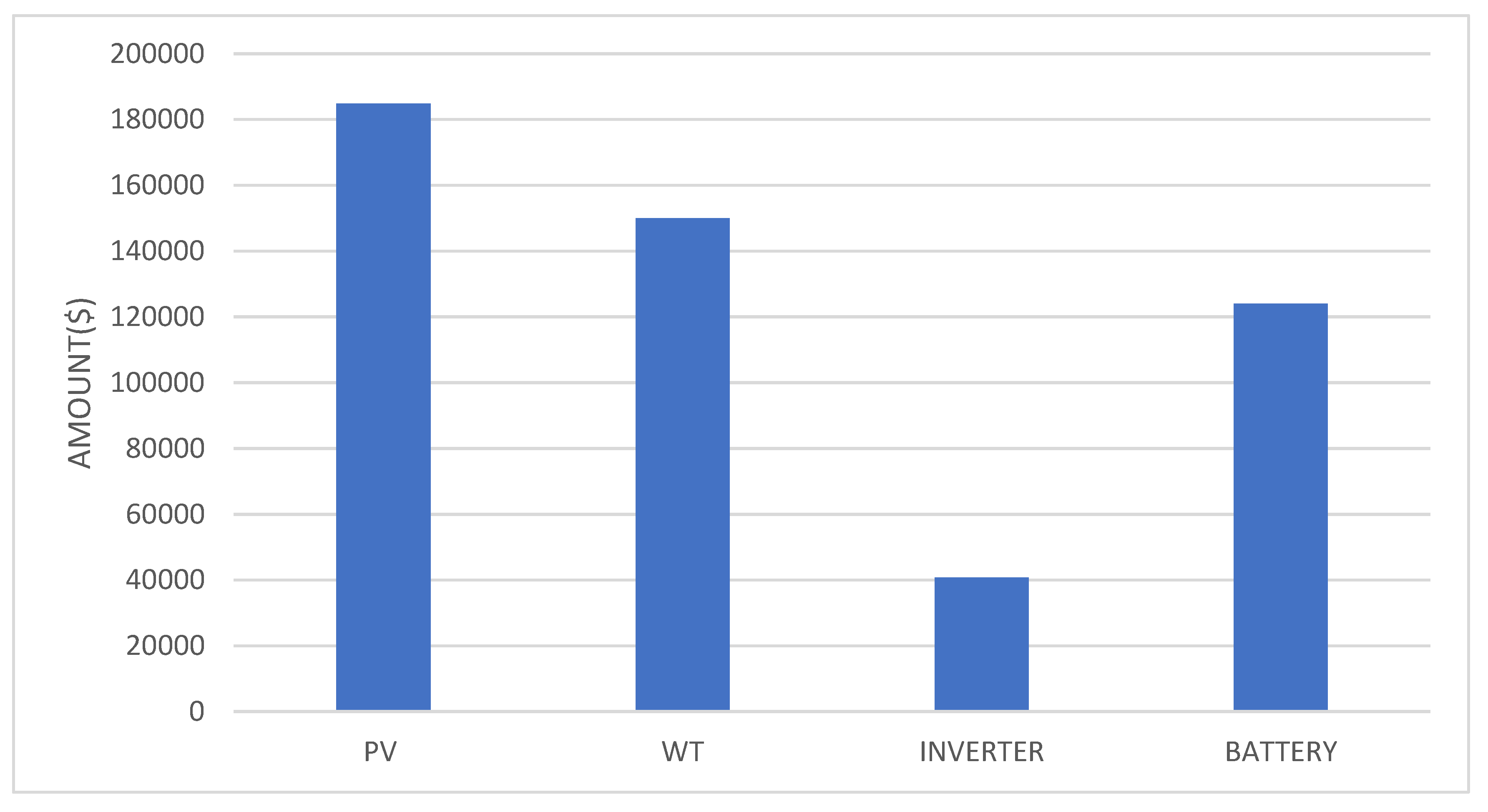
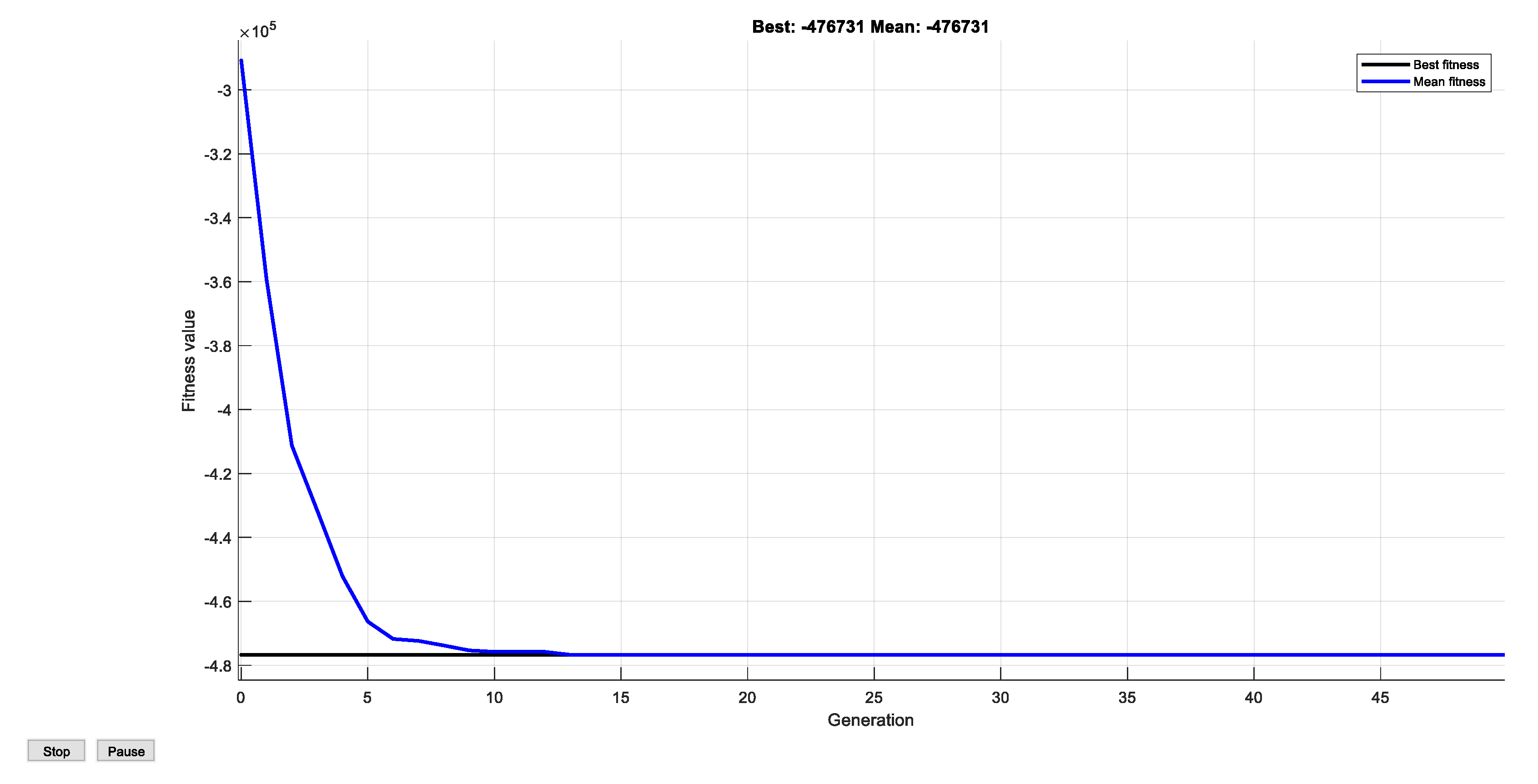
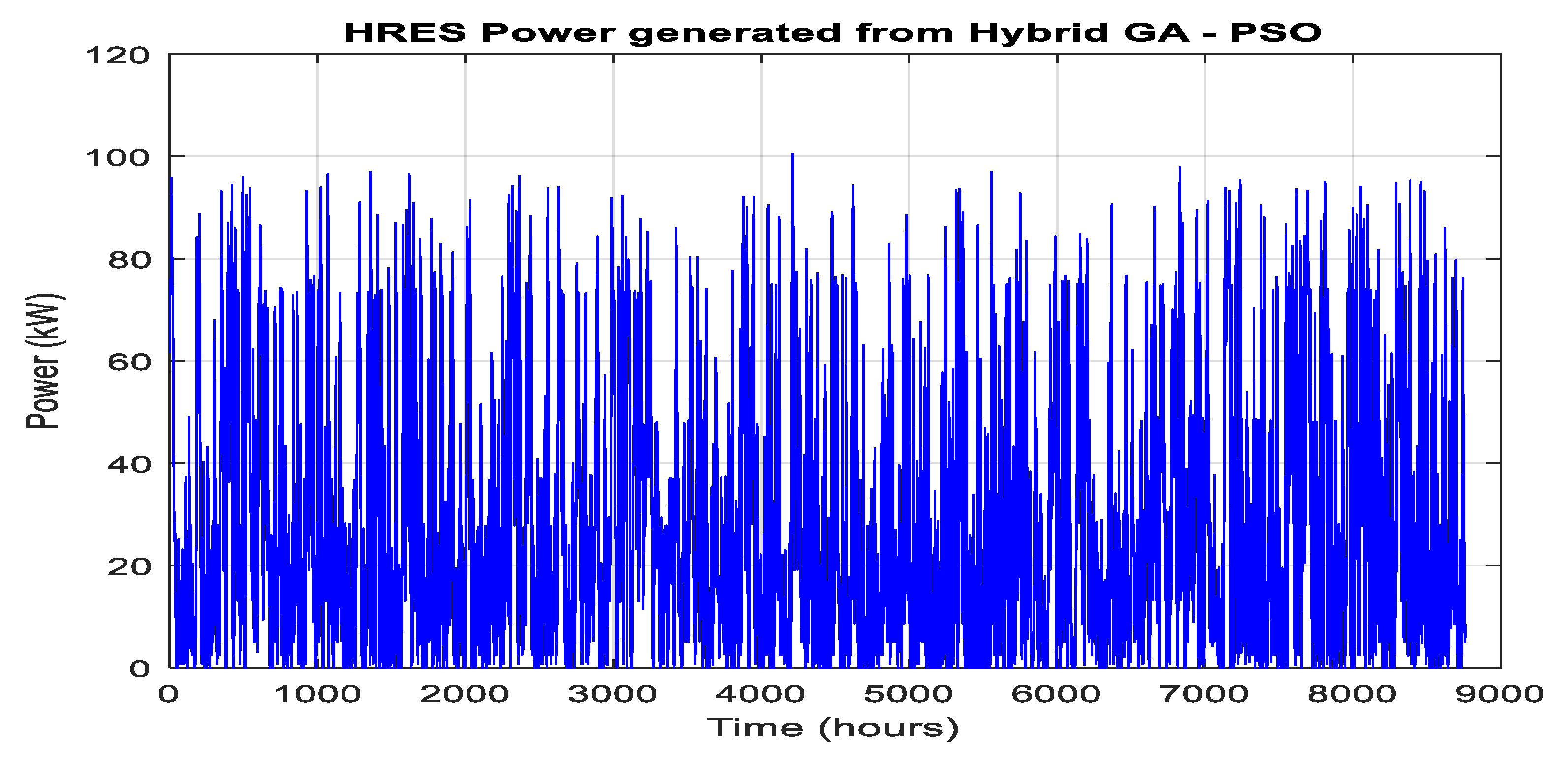

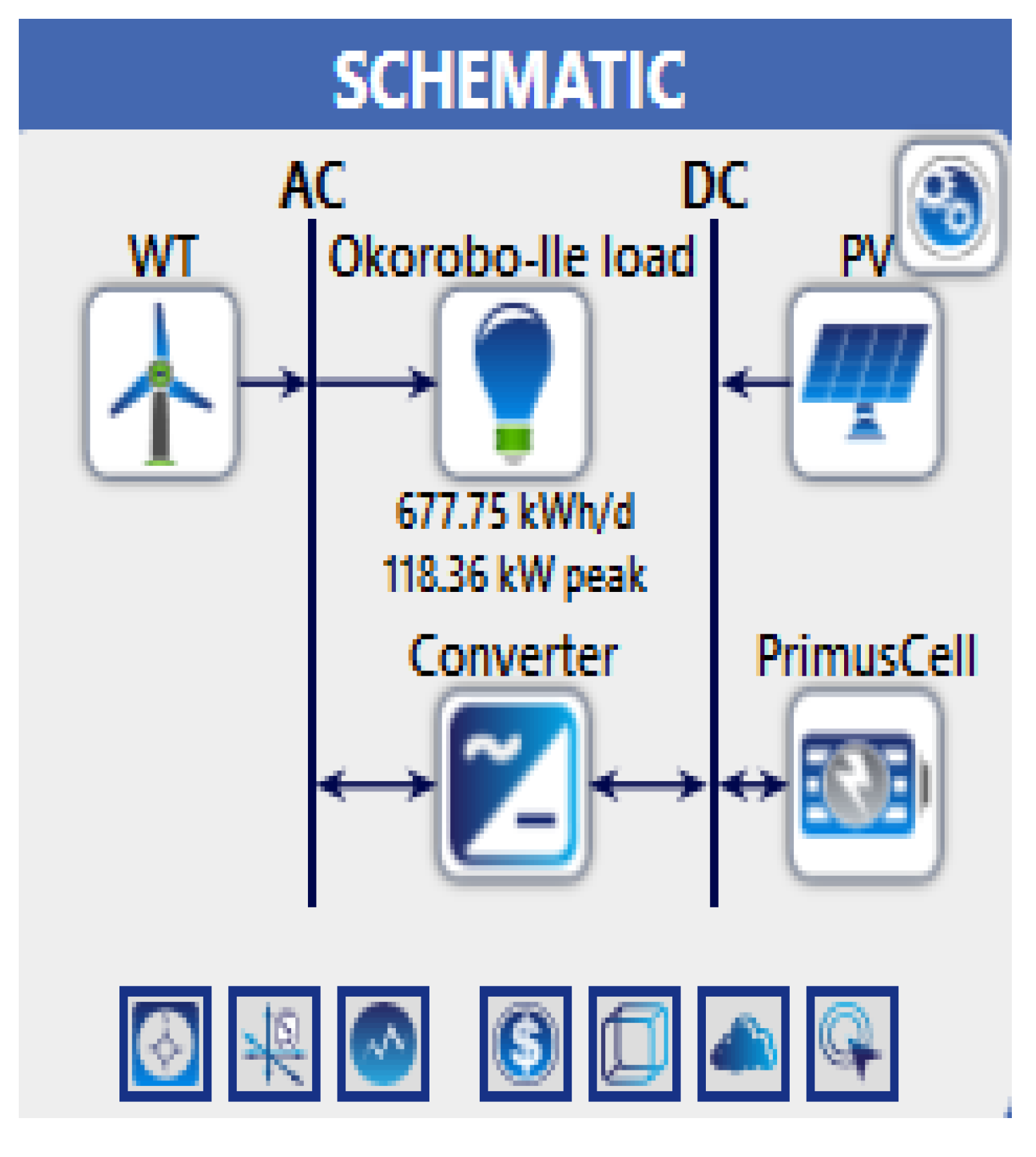
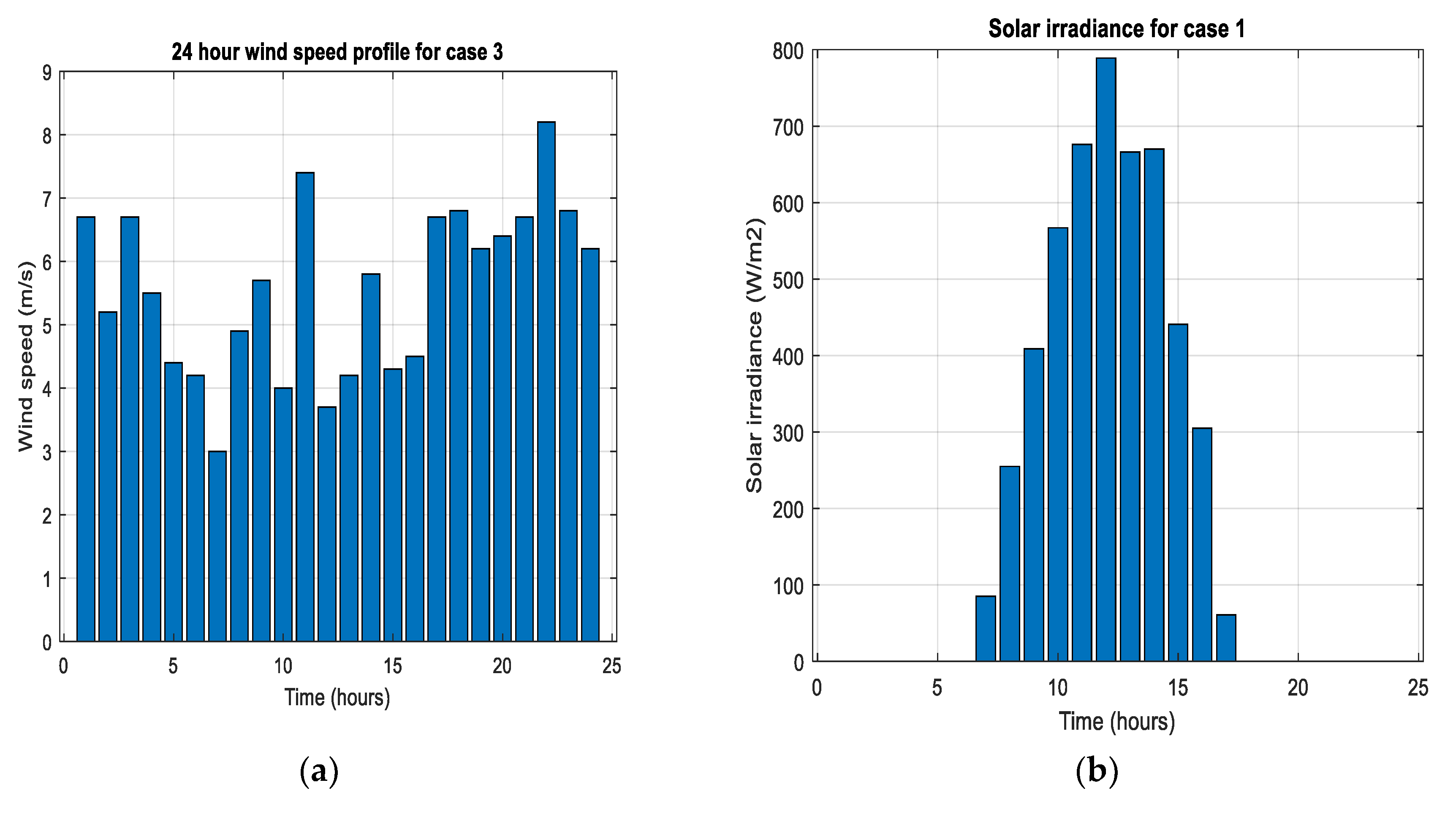
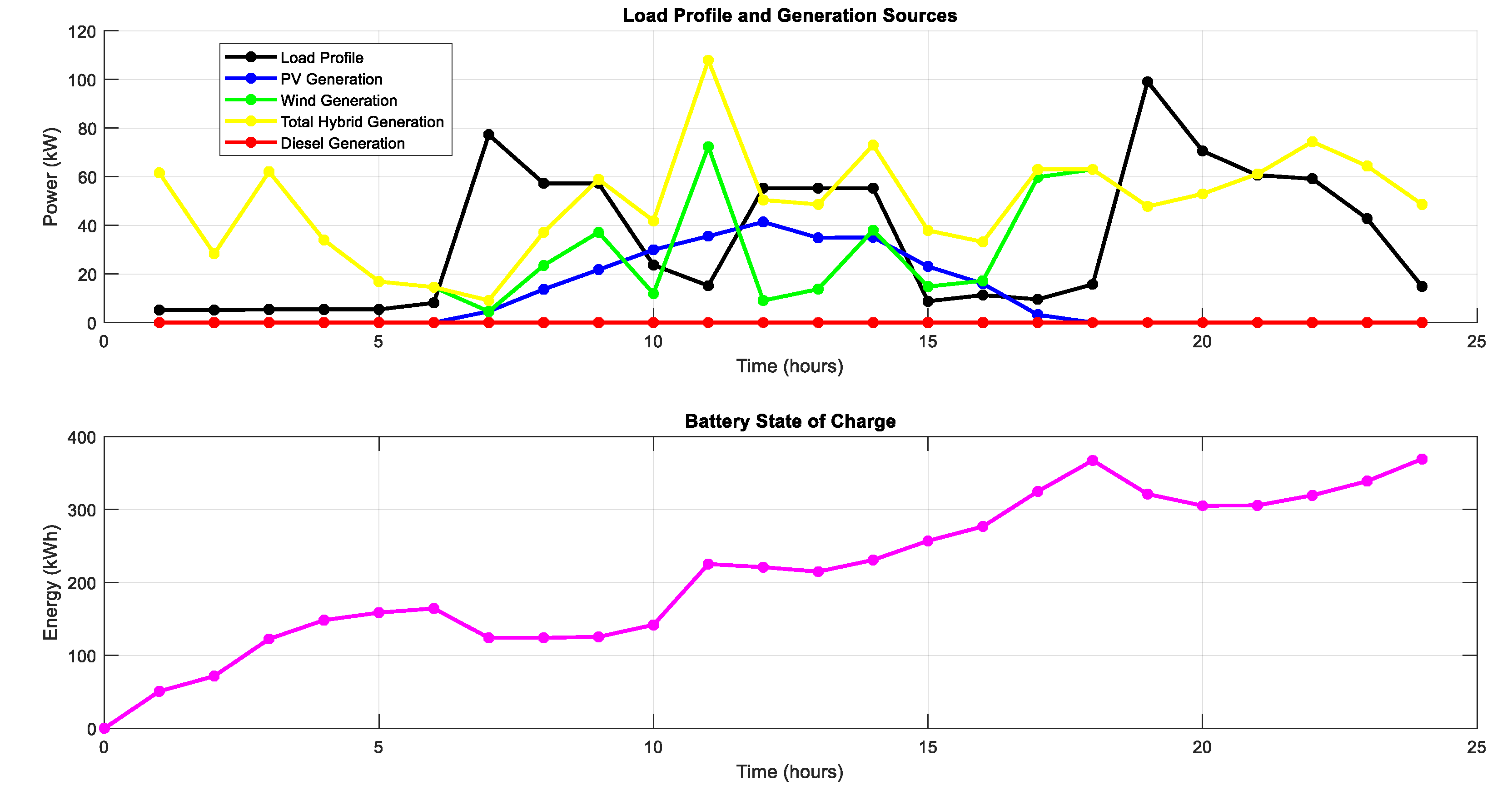
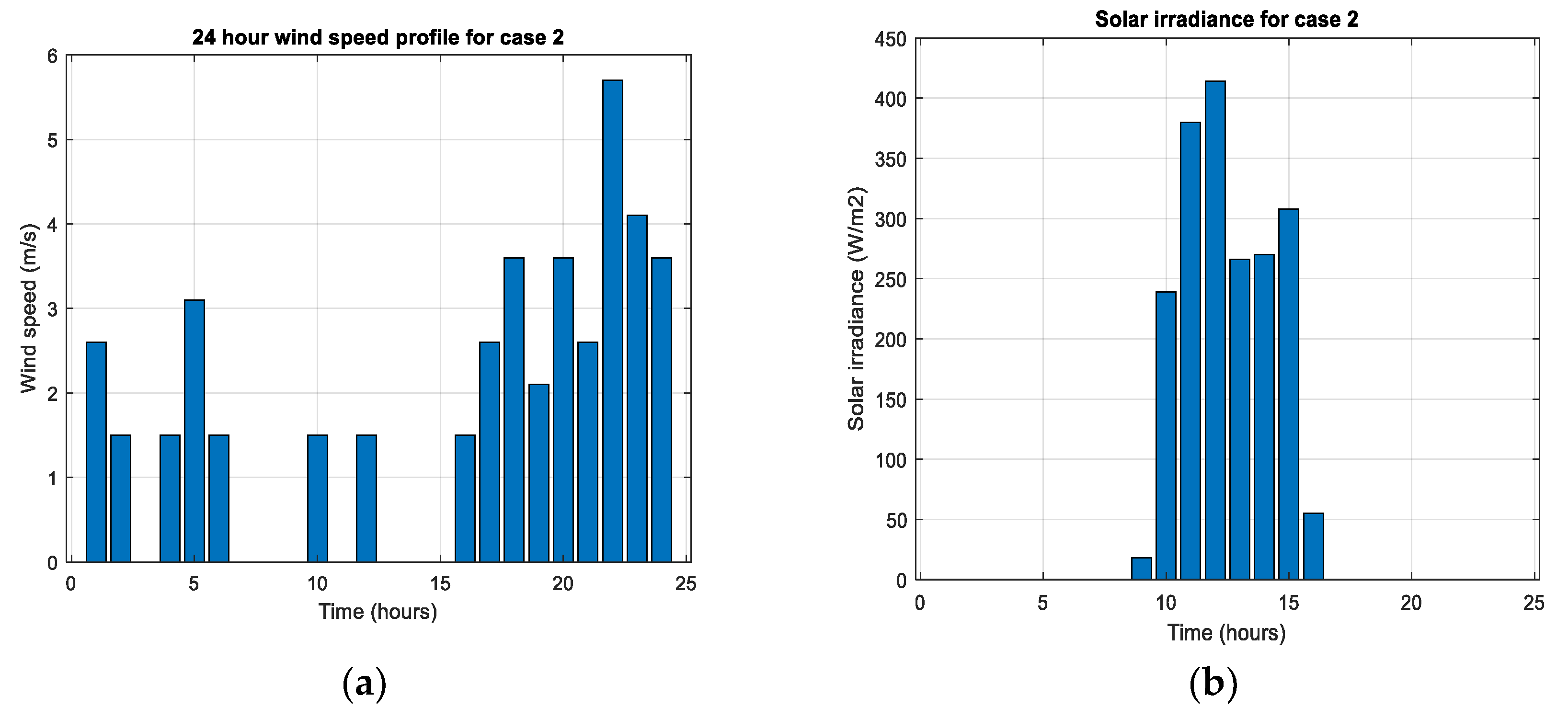
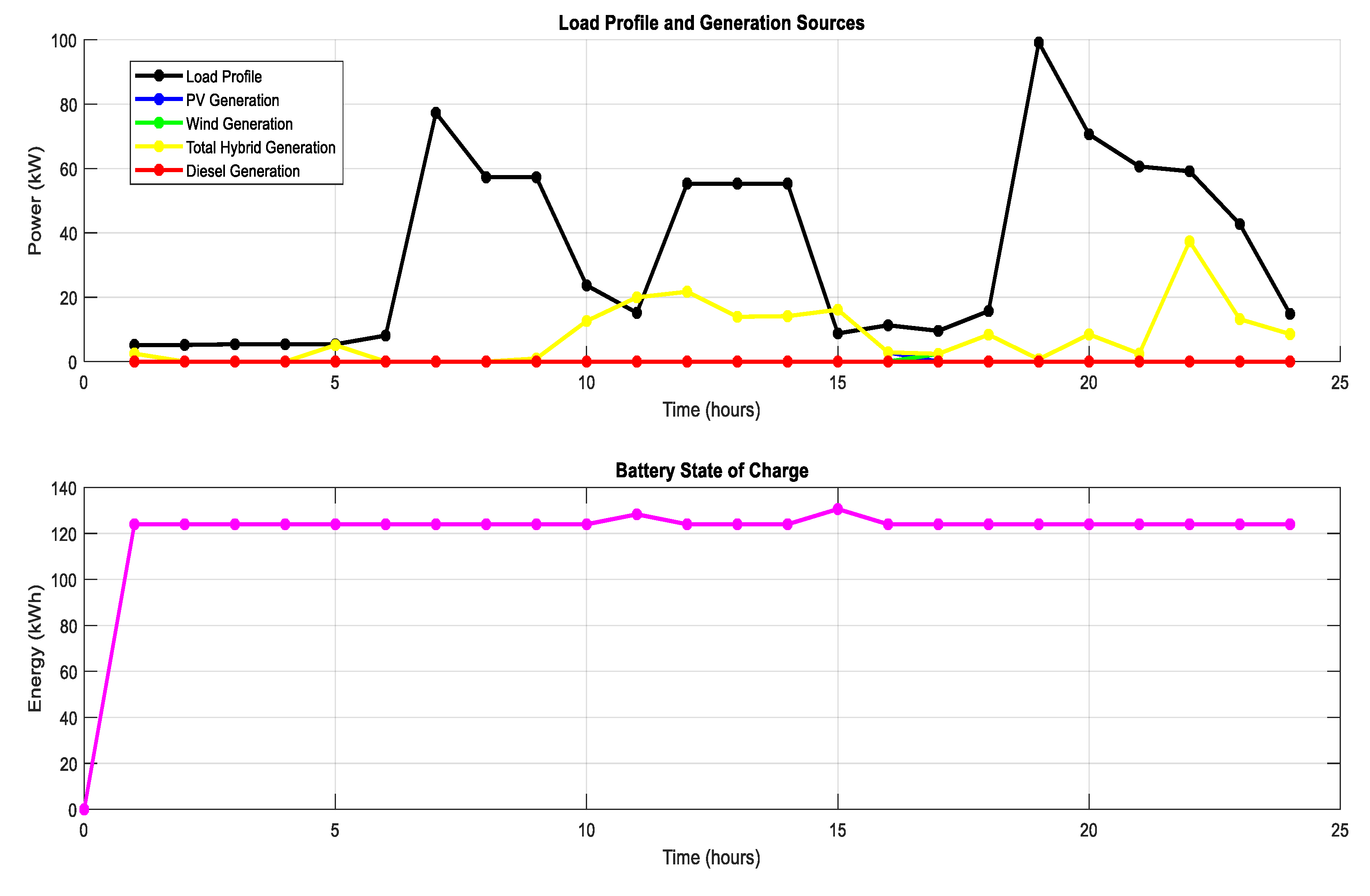
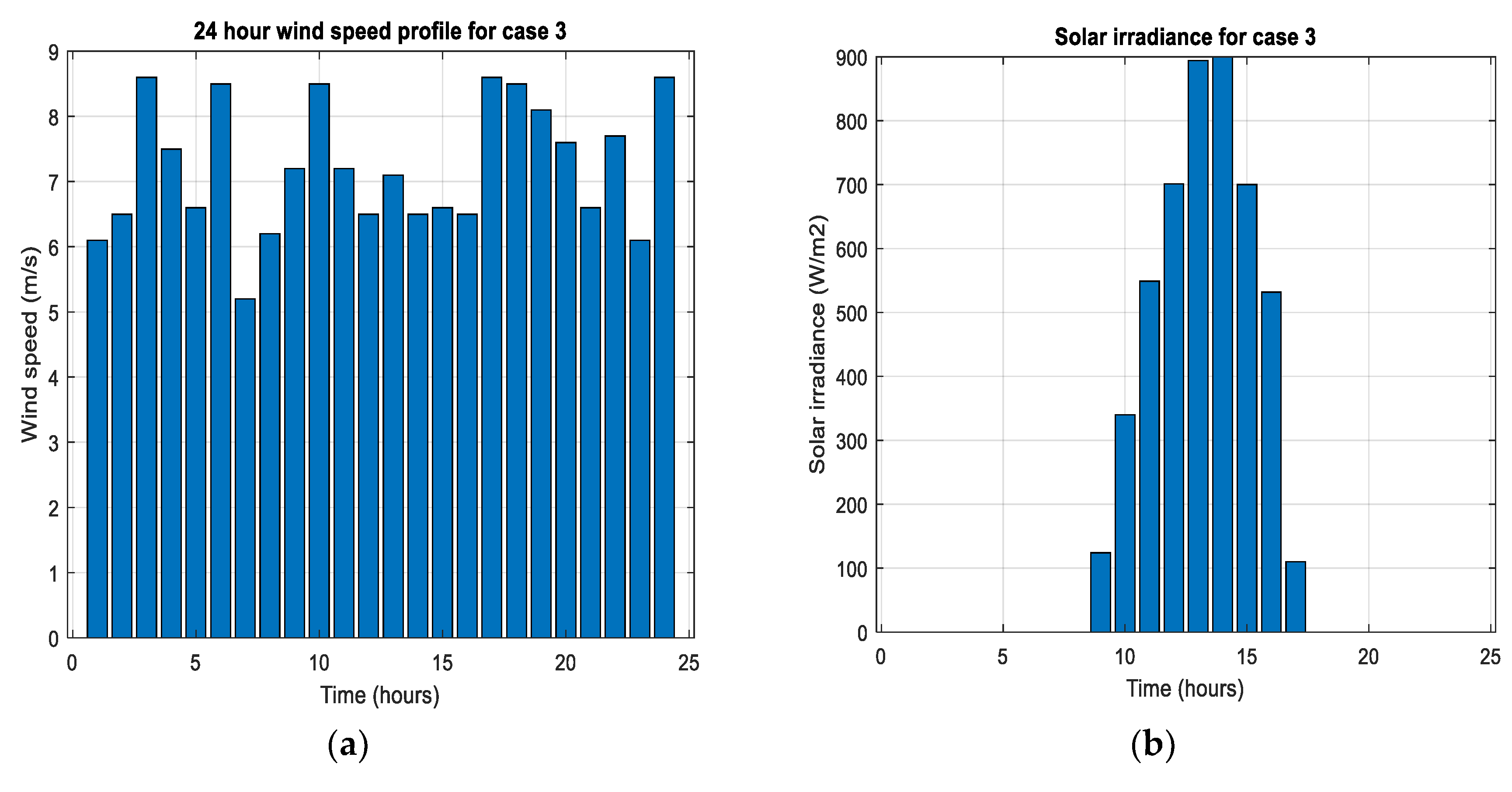
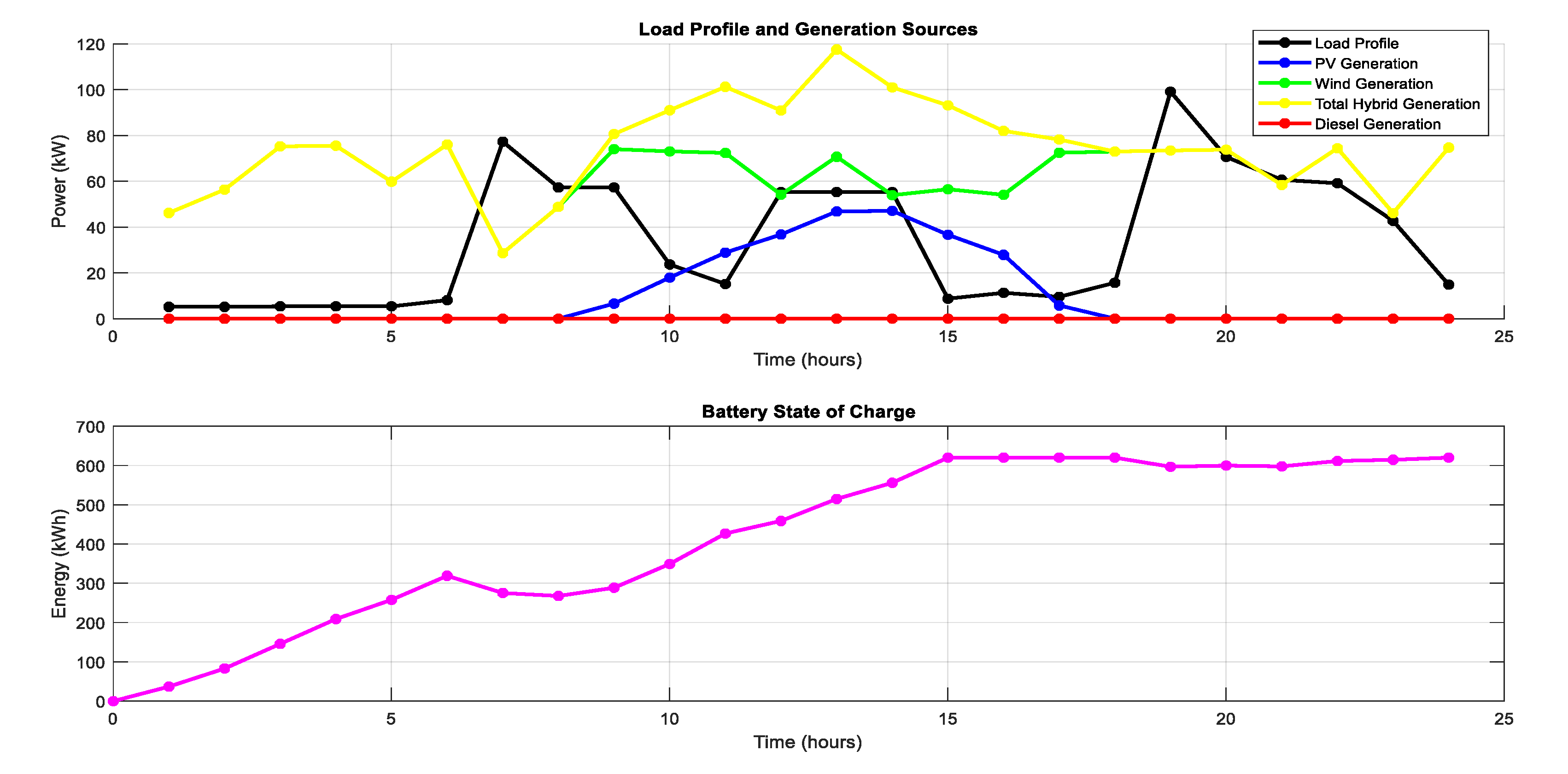
| Solar Panel Specification |
| Max power 1kW Dimension 1.8 × 1.0 m Panel efficiency 19.3% Panel temperature coefficient -0.005/ oC Initial cost (IC) 1200USD/kW O & M cost 10USD/kW Replacement cost 1000USD/kW Life span 20 years |
| Wind turbine |
| Rated power 25kW Cutin speed 5m/s Rated speed 12m/s Cutoff speed 25m/s Initial cost 5000USD/kW O & M cost 500USD/kW Replacement cost 5000USD/kW Life span 20 years |
| Inverter |
| Rating 1kW Efficiency 95% |
| Battery |
| Rating 72kWh Depth of Discharge (DoD) 80% Efficiency 85% |
| Economic |
| Inflation rate 40% Discount rate 30% Tax rate 30% Insurance rate 5% Salvage 20% of IC |
| Algorithmn | PV Panels | Wind Turbines | Inverters | Batteries | TEC/NPC(USD) | LCOE (USD/kWh) |
|---|---|---|---|---|---|---|
| PSO | 154 | 3 | 136 | 31 | $476,731(TEC) | $0.01 |
| GA-PSO | 154 | 3 | 136 | 31 | $476,731(TEC) | $0.01 |
| NGSA-II | 151 | 3 | 122 | 31 | $469,200(TEC) | 0.007 |
| HOMER (Proprietary Derivative-free) |
166 | 3 | 123 | 29 | $615,664.95(NPC) | $0.16 |
Disclaimer/Publisher’s Note: The statements, opinions and data contained in all publications are solely those of the individual author(s) and contributor(s) and not of MDPI and/or the editor(s). MDPI and/or the editor(s) disclaim responsibility for any injury to people or property resulting from any ideas, methods, instructions or products referred to in the content. |
© 2024 by the authors. Licensee MDPI, Basel, Switzerland. This article is an open access article distributed under the terms and conditions of the Creative Commons Attribution (CC BY) license (http://creativecommons.org/licenses/by/4.0/).

